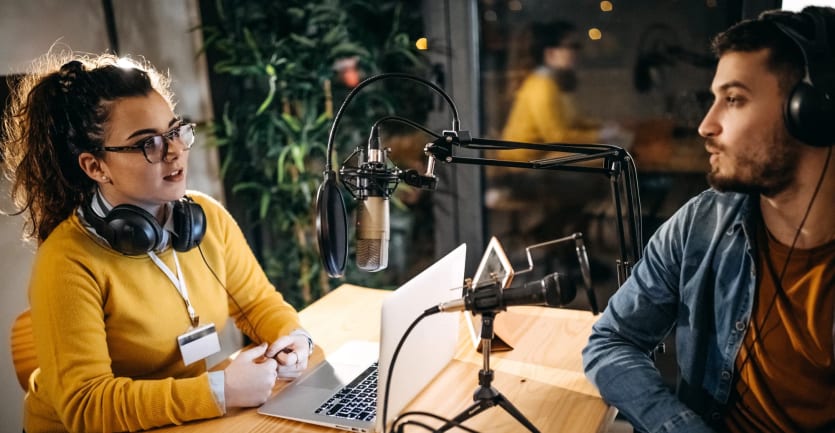5 Reasons to Take a Media Studies Course
- A growing field, media studies entails the study of various forms of mass communication.
- While many used to consider media studies courses frivolous, this view is evolving.
- Media studies allows students to conduct hands-on projects and combine different fields.
In the early 2000s, Mickey Mouse and his clubhouse unwittingly made their way into higher education, but not in a positive light. The U.K.’s higher education minister, Margaret Hodge, labeled classes she deemed trivial and irrelevant to the job market “Mickey Mouse courses.”
Among these academic programs considered Mickey Mouse-ish or “soft” — meaning frivolous and overly easy, as opposed to “hard” fields like STEM — is media studies.
A fairly new discipline, media studies can fall under an array of college departments, such as English, film, TV, visual media, American studies, or communications.
Students who take media studies courses or declare a media studies major analyze how the industries, practices, and content of mass media — which include radio, TV, film, newspapers, magazines, books, popular music, digital gaming, the internet, and social media — shape our perspectives of the world around us.
Free Online Media Studies Courses
Whereas some people believe studying a president’s tweets or Beyoncé’s fan base contributes nothing significant to society, many students and professors who actively engage in this type of study disagree.
According to the field’s defenders, students who take media studies courses aren’t just watching movies or playing around on Instagram; rather, they’re learning “the how and the why of communication” and its far-reaching effects on our cultures, communities, and democracies. And those lessons are anything but trivial.
I, too, echo these voices and think all students should take at least a couple of media studies courses before graduating college.

Why You Should Take a Media Studies Course
In comparison to subjects like math and literature, media studies is a relatively new field. In fact, it’s only been around for about a century, having taken off in the 1970s.
Despite its young age, media studies is a worthwhile discipline, especially when you consider the fact that we spend almost 12 hours a day interacting with media. Indeed, mass media are everywhere, shaping virtually everything we learn and determining what we talk and care about.
This is why I strongly recommend that students who are not majoring in media studies register for an elective media studies class or two at some point in their college careers.
But what specifically can you gain from studying this field? Here are five ways that taking a media studies course can benefit you, both in and outside the classroom.
You get to see how disciplines interact with one another
Media studies is interdisciplinary, meaning it explores more than one branch of knowledge. In a media studies course, you may, for example, learn about the corporate and governmental structures of how mass media operate. In doing this, you’d likely look at media from the perspective of business, economics, and mass communication. You may also study media messages and how media communicate ideas and ideologies by turning to fields such as psychology, sociology, and rhetoric.
You’ll learn how to think critically about media
Admittedly, most general education courses instruct students on how to think critically. For instance, the University of Chicago’s core classes aim to teach students “critical inquiry, argumentation, and analytical thinking in both quantitative and qualitative settings.” Developing this skill specifically in relation to mass media — and learning how to question and critique the messages coming from these entities — can be extremely useful, particularly as reports of “fake news” continue to snowball.
You’ll study up-to-date material
Because media are constantly changing, course materials — including textbooks, online supplements, and video clips — are evolving as well. Your media studies course will likely include assignments, review questions, and case studies on the latest media conglomerates, pop stars, video games, news outlets, TV shows, and Hollywood scandals. Since most college students are already plugged into several forms of media, current examples can make the class feel more familiar and therefore more engaging.
You can create hands-on projects
In media studies classes, students often take part in hands-on projects; they may make video essays, create newspapers, compile magazine ads, communicate with others through social media, attend film festivals, or put together a personal website. By interacting with mass media and modern technology in these ways — and questioning how and why we use them — college students can develop useful skills, such as maintaining a successful web presence or demonstrating social media etiquette.
You’ll become media literate
Most American adults interact with mass media about eight hours a day. It makes sense, then, that we ought to educate ourselves about the media and persistently ask questions such as these: Who created this? Why did they make it? Who is the target audience? What techniques are being used to make this message believable? While seemingly simplistic, these questions represent a solid basis for media studies and acquiring media literacy.

The Benefits of Media Literacy
Ultimately, by becoming media literate, we can do the following:
Imagine our culture as more complicated than what 24-hour news pundits may suggest.
Assume a critical stance that takes you outside your own norms and preferences.
Actively participate in debates about mass media and culture as a means to encourage social progress.
So why not spend an elective or two in college improving your media literacy? As Philip Thickett, former head of Birmingham City University’s School of Media, argues, “[We] don’t live in a ‘mickey mouse’ world and media studies is certainly no ‘mickey mouse’ degree.”